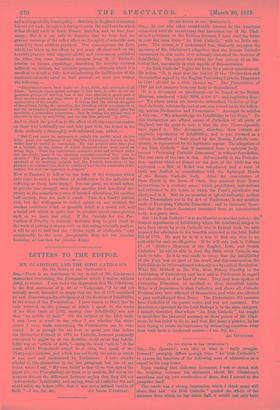(To THE EDITOR OF THE SPECTATOR.1
SIR,—As one who takes considerable interest in the questions connected with the controversy that has arisen out of Mr. Glad- stone's criticisms on the Vatican Decrees, I have read the letter in your last issue from "An Irish Catholic" with no little sur- prise. The writer, as I understand him, distinctly impugns the accuracy of Mr. Gladstone's allegation that the Roman Catholic. community in this realm ever solemnly disowned the doctrine of Infallibility. The matter lies within the four corners of an his- torical fact, necessarily as such capable of demonstration.
"An Irish Catholic" begins his letter by a patent misstatement. He writes, "It is time that the history of the 'Declaration and Protestation signed by the English Protesting Catholic Dissenters in 1789' should be a little cleared up." The Protestation of 1789 did not emanate from any body so denominated.
It is a document on parchment—to be found at the British Museum, numbered "Add. MSS. 5,416 A"—and beginning thus : —" We whose names are hereunto subscribed, Catholics of Eng- land, do freely, voluntarily, and of our own accord make the follow- ing solemn Declaration and Protestation." Amongst its articles. is this one: "We acknowledge no Infallibility in the Pope." To this,Declaration are affixed names of Catholics of all parts of England, but the point to note is that the four Vicars-Apostolic have signed it. The document, therefore, does contain an emphatic repudiation of Infallibility, and is put forward as a solemn declaration of their creed by the Roman Catholic com- munity, as represented by its legitimate organs. The allegation of "An Irish Catholic" that it emanated from a spurious body, termed "Protesting Catholic Dissenters," is without foundation. The real state of the case is this. Subsequently to the Protesta- tion—against which no dissent on the part of the Holy See was expressed — a Bill of Relief was introduced and a form of Oath was drafted in consultation with the Episcopal Heads of the Roman Catholic body. After the concurrence of these Heads in the form of Oath, they received from Rome- instructions in a contrary sense, which prohibitory instructions. had reference to the terms in which the Pope's jurisdiction was disavowed in it. But on no occasion of official authority, neither in the Protestation nor in the Act of Parliament, is any mention made of Protesting Catholic Dissenters ; and to insinuate, there- fore, that the former document emanated from an unauthorised
body, is a grave error. •
But "An Irish Catholic" is at sea likewise on another point,—the distinct repudiation of Infallibility which Mr. Gladstone alleges to. have been sworn by every Catholic who in Ireland took the oath imposed for admission to the benefits accorded in the Irish Relief Bill of 1793. He says he is at a loss to find any clue to an authority for such an allegation. If he will only look in Volume- IV. of "Butler's Memoirs of the English, Irish, and Scotch Catholics," he will be able to read the Oath every Catholic was made to take. In it he was made to swear that the Infallibility of the Pope was no part of his creed, and this asseveration the- Irish Bishops in 1810 confirmed solemnly in a Synodical Resolution. What Mr. Mitford or Mr. Pitt, what Bishop Hoadley or the Archbishop of Canterbury may have said in Parliament in regard to Catholicism, is of no kind of value. They may have spoken or Protesting Dissenters, or ascribed to them incredible tenets. What is of importance is what Catholics, and above all, Catholic Prelates, may have affirmed of themselves, and what was allowed to pass unchallenged from Rome. The Protestation did emanate from Catholics of the purest water, and was not censured. The Resolution expressed by the Irish Bishops is in the same category._ I submit, therefore, that where "An Irish Catholic" has sought to invalidate the historical accuracy on these points of Mr. Glad- stone, he has failed to do so, and that, like many a pleader, he has been trying to create an impression by distracting attention away from main facts to irrelevant matter.—I am, Sir, &c., AR OUTSIDER.


































 Previous page
Previous page